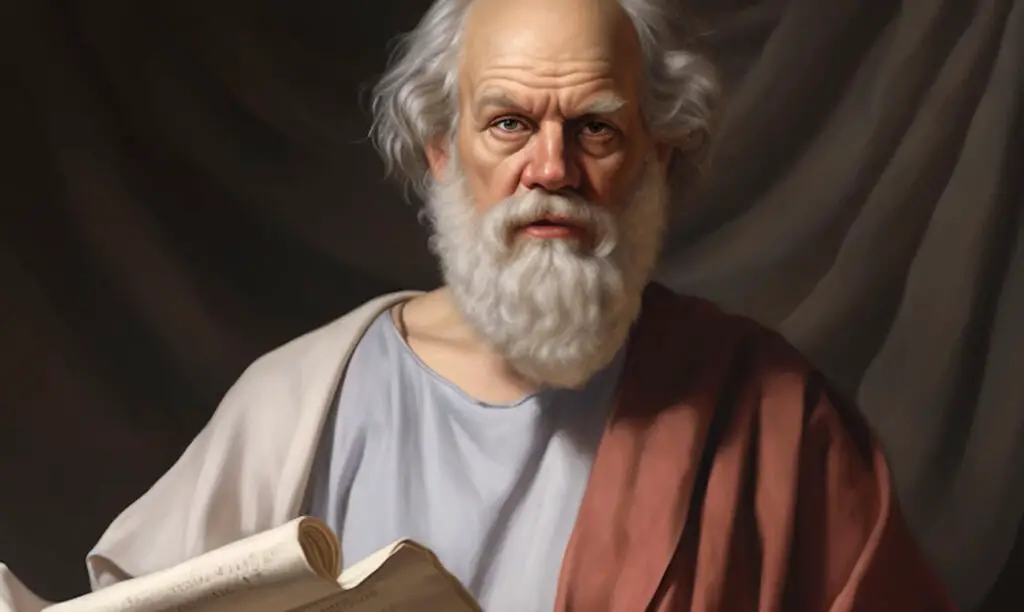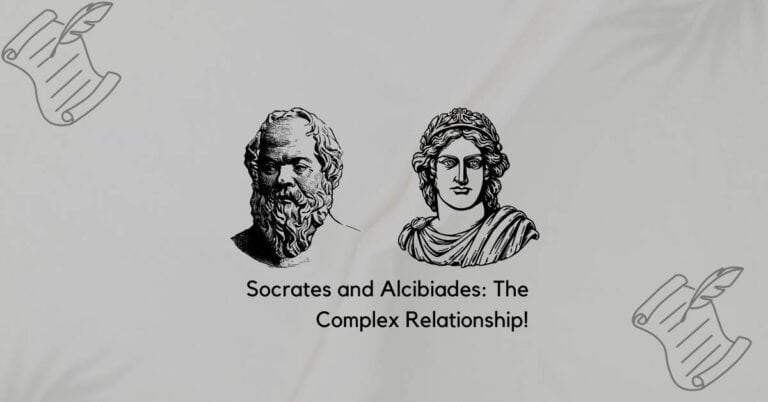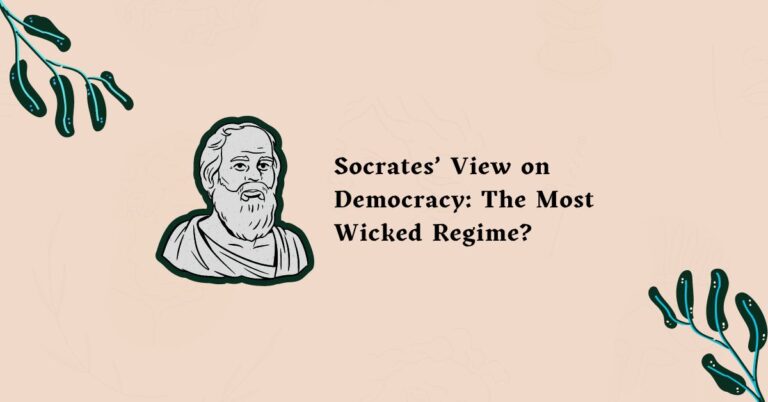Socrates’ Contributions to Philosophy: The Savvy Philosopher!
Imagine a time when philosophers weren’t stuck in dusty libraries… Socrates was different. He roamed the streets of ancient Athens, a city buzzing with new ideas and old problems. This was a time of war and political tensions, and people were starting to question everything.
Socrates was a total mystery! He spent his early years as a sculptor, but one day just decided to become…a philosopher? The kicker is he never wrote anything down. So, how do we know what he thought? Thank goodness for Plato, his star pupil, who became his biographer.
Socrates’ contribution to philosophy was immense. His relentless questioning, the Socratic Method, forced people to think about WHY they believed what they believed. This changed the game and set the stage for how we think about the world even today.
Who was Socrates? His Influence on Philosophy:
The sculptor-turned-philosopher
Socrates led a multifaceted life before his philosophical turn. He followed in his father’s footsteps as a stonemason, a testament to his humble origins and potential familiarity with the concept of shaping raw material into something meaningful. Additionally, he fulfilled his civic duty as a hoplite (soldier) in the Peloponnesian War, demonstrating his courage and dedication to Athens. This exposure to the harsh realities of conflict might have sparked early questions about justice, leadership, and human behavior.
The Delphic Oracle’s Proclamation
A pivotal moment in Socrates’ life was his encounter with the Oracle at Delphi. The Oracle, a revered priestess believed to channel the god Apollo, proclaimed Socrates the wisest man in Athens. This declaration was perplexing to Socrates, inspiring profound self-reflection on the nature of knowledge and the limits of his understanding. Far from becoming arrogant, the Oracle’s pronouncement ignited intellectual humility within him.
Socrates’ Philosophical Transformation
The Oracle’s words spurred Socrates’ philosophical journey. Fueled by a burning desire to understand the meaning behind the proclamation, he abandoned his former occupations to pursue a deeper understanding of wisdom and knowledge. His method, rather than lecturing or writing extensive treatises, involved engaging Athenians of all walks of life in thoughtful dialogue. Through relentless questioning, he sought to expose the limits of their understanding and the contradictions in their beliefs.
This interactive approach was likely born from his experiences as a craftsman, where dialogue and refinement are essential, and his time as a soldier, where clear communication and strategy are vital. Socrates’ unique background profoundly shaped his philosophical technique.
Key Points to Consider
- The Athenian Context: Socrates lived during a time of great change and uncertainty in Athens. The city-state was transitioning towards democracy, and traditional beliefs were being challenged. This environment may have contributed to Socrates’ critical thinking and desire to re-examine established ideas.
- The Value of Diverse Experiences: Socrates’ path demonstrates that wisdom isn’t confined to scholars. His hands-on experiences as a sculptor and soldier likely influenced his approach to seeking truth.
The Socratic Method: Socrates’ Key Contribution to Philosophy
Socrates, the Gadfly of Athens
Imagine not a serene lecture hall but the bustling Athenian marketplace. Socrates, a man more comfortable in battle gear than a philosopher’s robe, isn’t spouting grand theories. He’s zeroed in on a puffed-up politician, his questions as relentless as a swarm of gadflies. With each “Why?” and “How do you know?” smug certainty gives way to confusion.
This was the Socratic Method in action. Socrates saw himself as an intellectual gadfly, his role to sting Athens out of complacency. No one was off-limits – generals, poets, and artisans all faced his disarmingly simple questions.
The Art of Elenchus: Questioning Your Way to Truth
The core of the Socratic Method is “elenchus” – a rigorous cross-examination of beliefs. Socrates wasn’t there to lecture but to reveal the shaky foundations of assumed knowledge. He’d start with a core concept, like justice. Then, through deceptively simple questions, he’d force someone to define their terms, examine their examples, and confront inconsistencies in their reasoning.
A “Socratic Smackdown”
Picture a lavish dinner party. A respected statesman boasts of his deep understanding of virtue. Socrates, ever the curious observer, innocently asks for a definition. What begins as polite inquiry becomes a philosophical unraveling. The statesman stumbles over his own words, realizing that his grand pronouncements rest on flimsy notions. The other guests watch a mix of amusement and dawning discomfort – perhaps their own beliefs aren’t so watertight either.
The Courtroom Echo: The Socratic Method Today
The Socratic Method isn’t trapped in history. Imagine a modern courtroom – the fate of a case hinges on a seemingly ironclad alibi. With relentless questioning, the defense lawyer, channeling Socrates, exposes tiny inconsistencies in the witness’s timeline. The alibi crumbles, not because of new evidence, but because of deeper scrutiny of the evidence already presented.
Socrates’ method has become synonymous with critical thinking for a reason. It teaches us that the most dangerous assumption is the one we never question.
Examining Socrates’ Philosophical Perspectives on Key Issues:
Socrates and Democracy: A Critical View
Socrates was notably critical of Athenian democracy, questioning whether the populace was capable of making wise and informed decisions. His skepticism wasn’t against the concept of democracy itself but the execution that didn’t necessarily prioritize wisdom or informed judgment.
In the Platonic dialogues, he illustrates this with the allegory of the ship, where an unskilled majority navigates a vessel—a metaphor for state governance—suggesting that wise governance requires specialized knowledge akin to a ship’s navigator. Socrates’ critical stance on democracy emphasizes the need for education and informed participation in governance, posing an enduring question about the balance between democracy and expert leadership.
Socrates’ Views on Religion and God
Socrates challenged the conventional Athenian view of polytheism through his philosophical inquiries, promoting a vision of God as a singular, all-knowing, and morally perfect being. This stance led to significant tension with the prevailing religious practices of Athens, culminating in his trial, where he was accused of corrupting the youth and introducing new deities.
His defense, detailed in Plato’s ‘Apology,’ underscores his commitment to a personal and philosophical understanding of divinity. Socrates’ approach to religion invites a critical examination of the assumptions underlying traditional religious practices and the importance of personal integrity in spiritual pursuits.
Socrates’ Concept of Justice
Justice, for Socrates, involved the proper ordering of the soul and the city, each mirroring the other. In his work as depicted in Plato’s ‘Republic,’ he delineates a society structured around the natural aptitudes of its citizens, arguing that justice is achieved when everyone performs their designated role under the guidance of a philosophically informed leadership.
This idea extends to personal ethics, suggesting that a just individual maintains an internal balance of reason, spirit, and desire, managed by a well-educated, rational mind. Socrates’ vision of justice challenges us to consider deeper notions of societal roles and personal ethics, highlighting the interconnection between public justice and personal morality.
Key Socratic Concepts:
The Unexamined Life Is Not Worth Living: An Urgent Call to Introspection
Socrates’ most famous declaration is a rallying cry against passive living. Imagine him amidst the bustle of Athens, not lecturing on morality but shaking people awake with a bold question: “Is a life spent blindly following tradition, never investigating your values, truly worth living?”
This isn’t nihilism but a challenge. Socrates saw constant self-examination as the key to a meaningful existence. He believed comfort breeds complacency. Questioning our assumptions, even if unsettling, forces us to actively choose our beliefs and actions. This makes life intentional, not accidental.
Knowledge of One’s Ignorance: The First Step to Wisdom
Socrates, the Oracle’s “wisest man,” famously claimed he knew only one thing: that he knew nothing at all. This seems paradoxical, but it’s the heart of his method.
Picture this: someone claims to be an expert on justice. Socrates, with feigned humility, begs to learn from them. Through gentle questioning, he reveals they barely understand the term, let alone its complexities. This wasn’t cruelty but an eye-opening reveal. True wisdom begins with recognizing the limits of our knowledge. It clears the ground, making space for deeper exploration and growth.
Virtue is Knowledge: Morality as an Intellectual Pursuit
Socrates boldly proposed that being a “good person” wasn’t about blind obedience to rules but about understanding. Imagine him arguing that nobody knowingly chooses to be harmful or selfish. If someone acts wrongly, it’s from ignorance of what true goodness is.
Therefore, he believed virtue could be taught – not through dogma but through the relentless questioning of his method. By understanding ourselves, why we value certain things, and the impact of our actions, we become capable of true, lasting goodness. This makes morality an active quest, not a passive rulebook.
Socrates’ Influence on Western Philosophy:
Plato: The Scribe of Socrates
Socrates’ legacy is inseparable from Plato, his devoted student. Given that Socrates left no writings, Plato’s vivid dialogues are our window into his teacher’s thinking. But Plato was no mere recorder – he expanded upon Socratic ideas, developing his complex theories about the ideal state, the nature of the soul, and more. Plato ensured that the relentless questioning sparked in Athens’ markets would echo for centuries.
Aristotle: Building on the Foundations
Aristotle, Plato’s student, took a different path, favoring systematic observation and categorization over his teacher’s dialogues. Yet, the Socratic influence is evident. Aristotle’s emphasis on logic, definitions, and careful examination of premises is a direct descendant of the Socratic Method. He brought Socratic inquiry down from the realm of pure ideas and applied it to the physical world, laying the groundwork for scientific thought.
The Stoics: Echoes of Socrates in Seeking Serenity
Centuries later, Stoic philosophers found a kindred spirit in Socrates. Like him, they emphasized the supreme importance of reason in living a virtuous life. The Stoics believed that much of our suffering comes from clinging to things beyond our control. This resonates with the Socratic focus on what we can control: our own beliefs, judgments, and the relentless quest for self-understanding.
The Long Shadow: Socrates’ Impact on Western Thought
The story of Western philosophy is, in a way, a series of footnotes to Socrates. His emphasis on critical questioning was foundational – skepticism, empiricism, rationalism – all these movements stem, in part, from that initial challenge he posed in the Athenian marketplace. Socrates forced thinkers to justify their grand theories by starting with the simplest of questions.
The Trial and Death of Socrates:
Charges: Weaponizing Ambiguity
In 399 BCE, Socrates stood trial in Athens, facing two ambiguous charges:
- Corrupting the Youth: His critics accused him of misleading young Athenians by questioning traditional values and beliefs. This taps into broader social anxieties in Athens following its defeat in the Peloponnesian War.
- Impiety: Socrates was charged with rejecting the state-sanctioned gods and introducing new deities. This likely referred to his belief in a ‘Daimonion’ or guiding inner voice.
The Defense: A Philosopher on Trial
Socrates’ defense, immortalized in Plato’s Apology, was defiance disguised as humility. He portrayed himself as a gadfly divinely tasked with stinging the complacent city of Athens into intellectual and moral awareness.
- Cross-examination: He used his famed Socratic questioning to expose the inconsistencies of his accusers, yet many jurors took this as arrogance.
- No Regrets: Found guilty, rather than proposing exile (a common alternative), he suggested he be given free meals as a reward for his service to the city – further angering the jury, who then sentenced him to death.
Death and Its Philosophical Impact
Forced to drink hemlock, Socrates transformed his death into a performance for the ages. His composure in the face of injustice made him a philosophical martyr.
- Plato’s Legacy: Socrates’ death profoundly shaped Plato’s philosophy, leading to a distrust of democracy and a focus on the ideal realm of Forms.
- An Inspiration for Dissent: Throughout history, Socrates has become a symbol for the pursuit of truth, even when it challenges societal norms.
Socrates’ Legacy Today:
The Socratic Method: A Timeless Tool
The Socratic Method, with its emphasis on questioning assumptions and digging deeper for understanding, remains at the heart of effective education.
- Classrooms: Teachers employ Socratic questioning to stimulate critical thinking, debate, and the co-construction of knowledge.
- Therapy: Some therapists use Socratic techniques to help patients examine their thought patterns and uncover underlying beliefs.
- Law & Business: The Socratic Method is used in law schools to practice cross-examination and in business settings for problem-solving and strategic thinking.
Modern Self-Reflection: Echoes of Socrates
The Socratic emphasis on self-knowledge and inner questioning resonates with various contemporary self-improvement and personal reflection movements:
- Mindfulness: Like Socrates, mindfulness practices encourage awareness of one’s thoughts and promote non-judgmental observation of mental patterns.
- Journaling: Socratic-style reflective journaling prompts (“What are my unexamined assumptions about…?”, “How can I challenge my own biases?”) promote deeper self-understanding.
- Socratic-Inspired Dialogue: Online platforms and discussion groups foster Socratic-style exchanges for collective learning and personal growth.
Expanding the Scope
To make this section even more impactful, consider:
- Concrete Examples: Name specific schools or programs implementing the Socratic Method. Mention specific journaling prompts inspired by Socrates.
- Beyond the West: Investigate if Socratic-like traditions of inquiry exist in other cultures, past or present.
Conclusion:
Socrates, the enigmatic philosopher of ancient Athens, remains an enduring inspiration for anyone seeking truth and self-understanding. His greatest contributions to philosophy lie in his unwavering dedication to questioning assumptions and the relentless pursuit of knowledge. He rejected easy answers, emphasizing the importance of critical thinking and rational inquiry. By prioritizing reason, Socratic thought laid the foundation for the systematic way we approach logic and problem-solving today.
His controversial trial and death further glorified him as a symbol of standing by one’s convictions, even when it challenges societal norms. It’s no wonder that his life and philosophy continue to inspire movements aimed at introspection and intellectual honesty in a world often filled with unchallenged beliefs.
In the spirit of Socrates, let us leave with a question that begs continued contemplation: If the unexamined life is not worth living, how deeply are we truly willing to examine our thoughts and beliefs?



